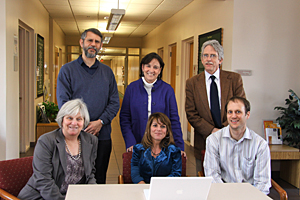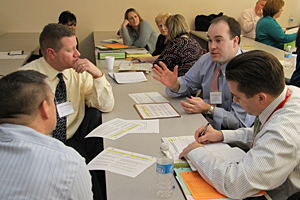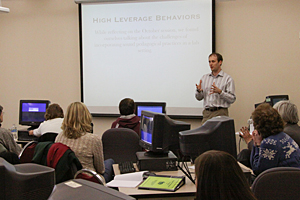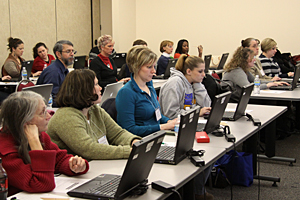

- Rozovsky wins prestigious NSF Early Career Award
- UD students meet alumni, experience 'closing bell' at NYSE
- Newark Police seek assistance in identifying suspects in robbery
- Rivlin says bipartisan budget action, stronger budget rules key to reversing debt
- Stink bugs shouldn't pose problem until late summer
- Gao to honor Placido Domingo in Washington performance
- Adopt-A-Highway project keeps Lewes road clean
- WVUD's Radiothon fundraiser runs April 1-10
- W.D. Snodgrass Symposium to honor Pulitzer winner
- New guide helps cancer patients manage symptoms
- UD in the News, March 25, 2011
- For the Record, March 25, 2011
- Public opinion expert discusses world views of U.S. in Global Agenda series
- Congressional delegation, dean laud Center for Community Research and Service program
- Center for Political Communication sets symposium on politics, entertainment
- Students work to raise funds, awareness of domestic violence
- Equestrian team wins regional championship in Western riding
- Markell, Harker stress importance of agriculture to Delaware's economy
- Carol A. Ammon MBA Case Competition winners announced
- Prof presents blood-clotting studies at Gordon Research Conference
- Sexual Assault Awareness Month events, programs announced
- Stay connected with Sea Grant, CEOE e-newsletter
- A message to UD regarding the tragedy in Japan
- More News >>
- March 31-May 14: REP stages Neil Simon's 'The Good Doctor'
- April 2: Newark plans annual 'wine and dine'
- April 5: Expert perspective on U.S. health care
- April 5: Comedian Ace Guillen to visit Scrounge
- April 6, May 4: School of Nursing sponsors research lecture series
- April 6-May 4: Confucius Institute presents Chinese Film Series on Wednesdays
- April 6: IPCC's Pachauri to discuss sustainable development in DENIN Dialogue Series
- April 7: 'WVUDstock' radiothon concert announced
- April 8: English Language Institute presents 'Arts in Translation'
- April 9: Green and Healthy Living Expo planned at The Bob
- April 9: Center for Political Communication to host Onion editor
- April 10: Alumni Easter Egg-stravaganza planned
- April 11: CDS session to focus on visual assistive technologies
- April 12: T.J. Stiles to speak at UDLA annual dinner
- April 15, 16: Annual UD push lawnmower tune-up scheduled
- April 15, 16: Master Players series presents iMusic 4, China Magpie
- April 15, 16: Delaware Symphony, UD chorus to perform Mahler work
- April 18: Former NFL Coach Bill Cowher featured in UD Speaks
- April 21-24: Sesame Street Live brings Elmo and friends to The Bob
- April 30: Save the date for Ag Day 2011 at UD
- April 30: Symposium to consider 'Frontiers at the Chemistry-Biology Interface'
- April 30-May 1: Relay for Life set at Delaware Field House
- May 4: Delaware Membrane Protein Symposium announced
- May 5: Northwestern University's Leon Keer to deliver Kerr lecture
- May 7: Women's volleyball team to host second annual Spring Fling
- Through May 3: SPPA announces speakers for 10th annual lecture series
- Through May 4: Global Agenda sees U.S. through others' eyes; World Bank president to speak
- Through May 4: 'Research on Race, Ethnicity, Culture' topic of series
- Through May 9: Black American Studies announces lecture series
- Through May 11: 'Challenges in Jewish Culture' lecture series announced
- Through May 11: Area Studies research featured in speaker series
- Through June 5: 'Andy Warhol: Behind the Camera' on view in Old College Gallery
- Through July 15: 'Bodyscapes' on view at Mechanical Hall Gallery
- More What's Happening >>
- UD calendar >>
- Middle States evaluation team on campus April 5
- Phipps named HR Liaison of the Quarter
- Senior wins iPad for participating in assessment study
- April 19: Procurement Services schedules information sessions
- UD Bookstore announces spring break hours
- HealthyU Wellness Program encourages employees to 'Step into Spring'
- April 8-29: Faculty roundtable series considers student engagement
- GRE is changing; learn more at April 15 info session
- April 30: UD Evening with Blue Rocks set for employees
- Morris Library to be open 24/7 during final exams
- More Campus FYI >>
9:30 a.m., April 1, 2009----It's called the “Monty Hall problem.” In this classic mathematical brainteaser, a game show host offers a contestant a choice of one of three doors. Behind one of the doors is a new car. Behind the other two are goats.
The contestant picks a door. Her odds of guessing the right one are one in three. Without opening the chosen door, the game show host reveals a goat behind one of the two unchosen doors and offers the contestant a chance to change her selection. But should she? Are her odds improved now that she knows the car is behind one of two doors?
About 100 secondary math teachers from around the state of Delaware worked to explain the mathematical principles behind this problem at a recent professional development session at Delaware Technical and Community College's Terry Campus in Dover.
Powerful Pedagogical Practices, or P-Cubed for short, is a program aimed at improving secondary math education by “problematizing” the manner in which secondary teachers approach mathematics instruction.
The P-Cubed program is sponsored and supported by the Delaware Mathematics Coalition in partnership with the University of Delaware's Mathematics and Science Education Resource Center (MSERC) in the College of Human Services, Education and Public Policy and is funded by a state-awarded U.S. Department of Education Mathematics and Science Partnership grant.
According to Jon Manon, professor of education at the University of Delaware and director of MESRC, the term “problematizing” refers to a way of thinking both about math lessons and teaching.
“Rather than thinking about their lessons as a series of things to tell students,” he says, “we want teachers to think about them as a series of problems to be solved.”
This approach also requires teachers to view their own teaching as a problem to be solved. They must evaluate each strategy and classroom behavior for effectiveness, break old habits of lecturing and presenting solutions to their students, and instead learn new teaching behaviors for facilitating discussion and mathematical reasoning among students, a process the program's leaders refer to as “helping students find their mathematical voice.”
Manon also uses another metaphor to explain the goals of P-Cubed.
“I like to say that students arrive at high school with their mathematical luggage already packed with the things they've learned and ideas they've formed up to that point,” he says. “It's the teacher's job to help students unpack their luggage and discover how to repack it in better order than when they arrived.”
The unpacking process requires setting up problems that enable students to confront their misconceptions.
“Many things about math seem to be counterintuitive at first, including the Monty Hall problem,” Manon continues. “When students experience the cognitive dissonance that happens when their intuition and preconceived ideas aren't working, then they become more open to new ways of looking at problems.”
Tools and techniques
Manon and the program's leaders then provide teachers with tools and techniques to guide their students' attempts to “repack” or find new solutions to problems.
The teachers experienced this process for themselves at the most recent P-Cubed session. Based on the teachers' input that probability is one area they find difficult to teach, a major focus of this year's sessions has been probability problems.
The “hook” of probability, Manon says, is the students' interest in games of chance, but the principles apply to many other problems involving risk and reward that they are likely to encounter in their personal and professional lives.
In addition to the Monty Hall problem, teachers at the recent session, grappled with the “birthday problem” - that is, given any two people chosen at random, what are the odds that they will have been born on the same day of the week? What if you increase the number of people to three? The teachers' small group discussions about this problem revealed that many of them harbor the same misconceptions as their students.
In addition to modeling discussion-leading behavior, the professional development leaders also demonstrate how technological tools can assist students in arriving at the desired conclusions. In probability problems in particular, patterns are often revealed by conducting a large number of trials, which can be accomplished quickly with computers.
Brad Glass, assistant professor of education in UD's School of Education, and Val Maxwell, teacher in residence at MSERC from the Appoquinimink School District, led their groups in exploring the Monty Hall problem using spreadsheet software to determine the outcome of a large number of possible contestant choices.
In the end, the teachers concluded that switching doors after the position of one goat was revealed would increase the contestant's odds of winning the car to two-thirds. (Confused? Try drawing a decision tree with all the possible outcomes on paper.)
Extraordinary commitment
According to Jamila Riser, executive director of the Delaware Mathematics Coalition and one of the professional development leaders, the P-Cubed program requires extraordinary commitment from the teachers and their administrators. Chosen to participate because of their desire to improve their pedagogical practices, the teachers attend monthly professional development sessions that foster growth as a community of reflective practitioners.
During the year, teachers focus on moving toward targeted action research goals that promote student learning and a classroom more centered on student thinking. Furthermore, they are encouraged to share their P-Cubed experiences with other department members at their respective schools.
“As teachers, we continue to struggle to teach in new and different ways,” says Riser. “This is especially challenging when the materials we use don't support teaching in student-thinking centered ways. We continue to work together to develop a desire to move toward a problem-based learning environment.”
Administrators from each of 19 public and one charter school district in Delaware also attend the development sessions. Administrator sessions promote the development of a shared vision of what good mathematics instruction looks like as well as provide time for school leaders to discuss and plan ways to support teachers in implementing their selected goals.
These goals include such “high-leverage behaviors” as maximizing opportunities for students to engage in discussions involving proof, justification and argumentation in the classroom.
Manon says the impact of the program was not immediately evident in students' scores on the Delaware State Testing Program (DSTP) standardized tests after just one year of teacher development. However, the group will continue tracking results following the second and third years.
“Increase in student scores is usually a lagging indicator,” he says. “It takes some time for teachers to become proficient in the new techniques.”
Results have been most apparent in programs like the Ninth Grade Academy at Smyrna High School, a program for incoming students judged to be at risk for underperformance in high school.
“The implementation of the freshman academy at Smyrna High School with the incorporation of P-Cubed techniques and technology helped our students raise their overall scale score 1,200-plus points from eighth grade in 2007 to ninth grade in 2008,” says Jennifer Spinden, a Smyrna High School math teacher. “I have learned so much from being a member of the P-Cubed cohort and so have my students. The best thing about P-Cubed is that it has allowed me to take a back seat in teaching while the students take a front seat in learning.”
Article by Beth Chajes
Photos by Mike Baker




